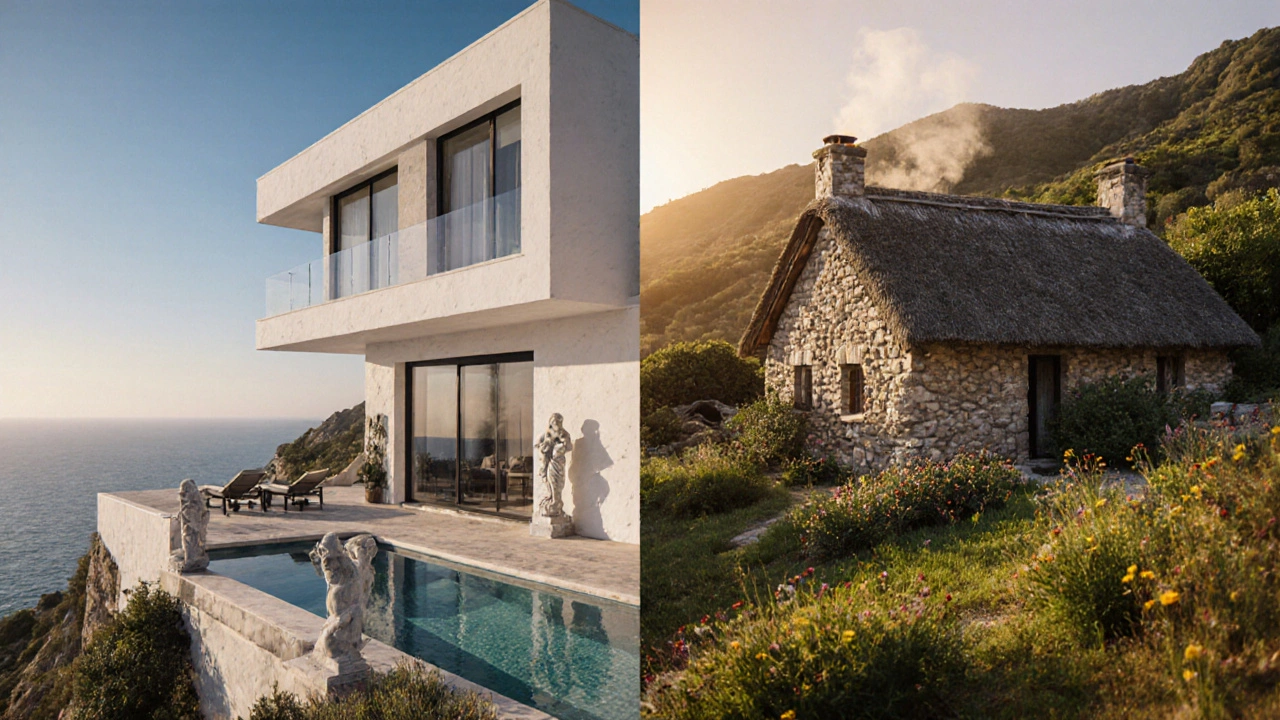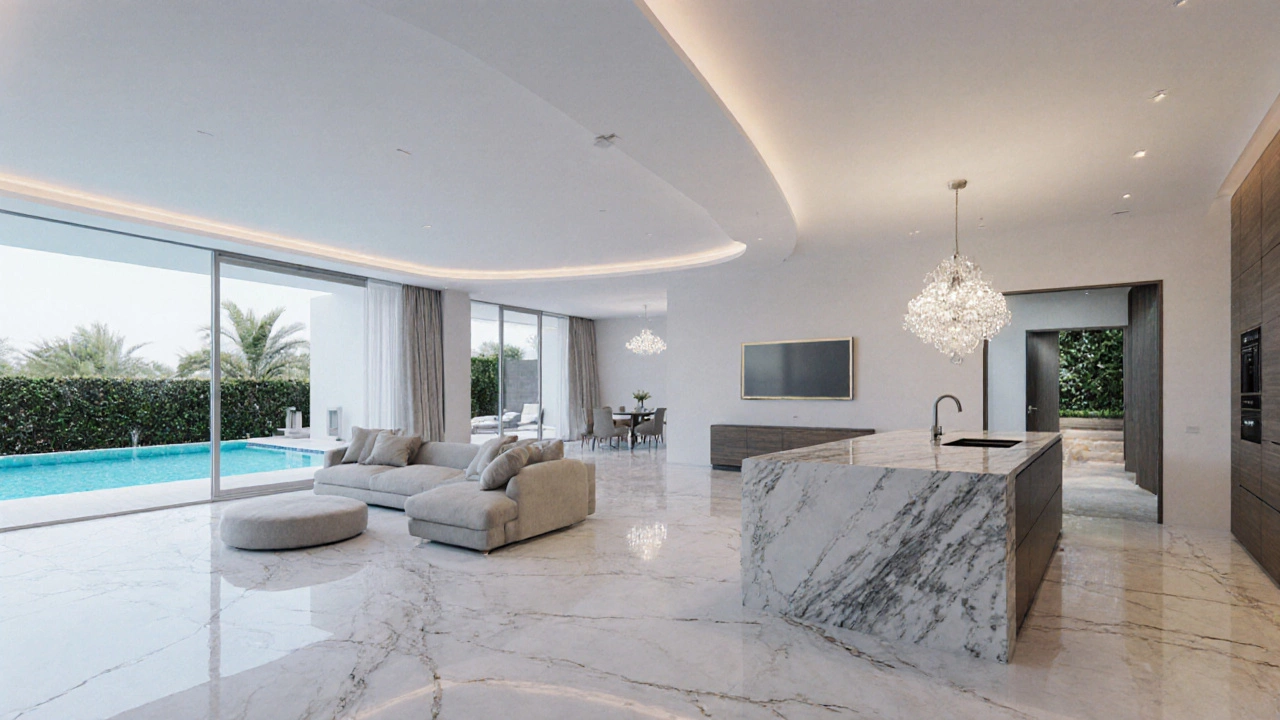Villa vs Cottage: Key Differences Explained
 Oct, 13 2025
Oct, 13 2025
Villa or Cottage Decision Calculator
Find Your Perfect Property
Answer a few questions to see if a villa or cottage better matches your needs
Ever wondered whether a villa or a cottage better fits your next getaway or purchase? The two terms sound similar but point to distinct lifestyles, designs, and budgets. Below we unpack the core differences, so you can decide which property type matches your needs.
Quick Takeaways
- Villas are usually larger, more luxurious, and often part of a resort or upscale residential area.
- Cottages are smaller, cozier, and traditionally built in rural or semi‑rural settings.
- Price, space, and amenities vary dramatically - villas can cost millions, cottages often start in the low‑hundreds of thousands.
- Pick a villa for privacy, pool, and high‑end finishes; choose a cottage for charm, simplicity, and a tighter connection to nature.
What is a Villa?
Villa is a large, detached residence that emphasizes luxury, privacy, and often includes exclusive amenities such as private pools, expansive gardens, and multiple living areas. Historically, the word comes from Roman country houses, but today it describes upscale homes in both urban and resort contexts.
Typical characteristics:
- Square footage usually above 3,000sqft (≈280m²).
- Multiple bedrooms (4‑8+), often with en‑suite bathrooms.
- High‑end finishes - marble countertops, smart‑home systems, imported fixtures.
- Private outdoor spaces - gardens, terraces, sometimes a separate guest house.
- Often located in gated communities, beachside resorts, or hillside estates.

What is a Cottage?
Cottage is a small, modest dwelling traditionally built in rural areas, characterized by a cozy atmosphere, simple architecture, and a close relationship with the surrounding landscape. The term evokes images of stone walls, thatched roofs, and a warm fireplace.
Key traits:
- Usually under 2,000sqft (≈185m²); many are under 1,200sqft.
- One‑ or two‑story layout, often with 1‑3 bedrooms.
- Architectural elements like exposed beams, wood siding, and pitched roofs.
- Outdoor space is typically a small garden or yard, not a sprawling estate.
- Found in countryside villages, mountain retreats, or historic parklands.
Core Differences Between a Villa and a Cottage
| Aspect | Villa | Cottage |
|---|---|---|
| Size | 3,000sqft+ (≈280m²+) | Under 2,000sqft (≈185m²) |
| Typical Bedrooms | 4‑8+ | 1‑3 |
| Luxury Level | High‑end finishes, private pool, smart home tech | Simple finishes, fireplace, rustic charm |
| Location | Gated estates, beachfront resorts, hilltop neighborhoods | Rural villages, mountain foothills, historic countryside |
| Price Range (US market, 2025) | $800k‑$5M+ | $150k‑$600k |
| Common Amenities | Infinity pool, home theater, gym, multiple living zones | Wood‑burning stove, garden, small porch, basic kitchen |
These side‑by‑side points highlight why the two options serve different lifestyles. If you value space, privacy, and a suite of upscale services, a villa is the clear winner. If you crave intimacy, heritage, and a tighter budget, a cottage fits better.

Choosing the Right Fit for Your Needs
Before you sign a contract or book a stay, ask yourself these practical questions:
- Purpose: Are you looking for a permanent home, a vacation rental, or a short‑term stay? Villas often double as investment properties, while cottages are popular for weekend getaways.
- Space Requirements: How many guests will you host? A villa can comfortably accommodate large families or groups; a cottage works best for couples or small families.
- Budget: Include not just purchase price, but ongoing costs-maintenance, utilities, property taxes. Villas can have higher HOA fees.
- Location Preference: Do you want sea views or mountain air? Villas dominate premium coastal zones; cottages thrive in quieter inland settings.
- Desired Lifestyle: Want a private pool and home gym? Go villa. Prefer a fireplace and walking trails? Choose cottage.
Answering these points will narrow the field quickly, saving time and money.
Practical Tips When Buying or Renting
Whether you’re eyeing a Mediterranean villa in Spain or a stone cottage in the New Zealand countryside, keep these guidelines in mind:
- Real Estate markets fluctuate based on location, economic trends, and local demand. Research recent sales and rental yields before committing.
- Inspect the Architectural Style to ensure it matches your aesthetic preferences and local building codes. A villa may have modern minimalism; a cottage might feature Georgian details.
- Check for essential Amenities such as reliable water supply, heating, internet connectivity, and security systems. Missing amenities can add unexpected costs.
- Measure the Size in both square footage and usable layout. A larger footprint doesn’t always equal better flow.
- Consider the Location in terms of accessibility, nearby services, and future development plans. Proximity to airports or city centers can affect rental demand.
Following these steps helps you avoid buyer’s remorse and ensures the property fits your long‑term vision.
Frequently Asked Questions
Is a villa always more expensive than a cottage?
Generally, yes. Villas are built larger and include higher‑end finishes, which drive up price. However, location can flip the script-a beachfront cottage in a premium tourist spot may cost more than an inland, modest villa.
Can I use a villa as a short‑term vacation rental?
Absolutely. Many owners list their villas on platforms like Airbnb or Vrbo, capitalizing on the luxury market. Just check local regulations; some regions impose licensing fees for short‑term rentals.
Do cottages have to be historic?
Not at all. While many cottages are historic, new builds mimic the style-think modern timber frames, eco‑friendly insulation, and open‑plan interiors.
What maintenance issues are unique to villas?
Villas often have larger pools, extensive landscaping, and advanced home‑automation systems. Maintaining a pool, pruning mature gardens, and updating software patches can add to the yearly upkeep budget.
Which property type offers better resale value?
It depends on the market. In high‑tourism coastal zones, villas often appreciate faster due to scarcity. In rural heritage areas, well‑preserved cottages can command premium prices because of their character and limited supply.
Now you’ve got the facts, the numbers, and the practical pointers to tell the difference between a villa and a cottage. Whether you’re buying, renting, or just day‑dreaming, the right choice hinges on space, lifestyle, and budget. Happy house hunting!